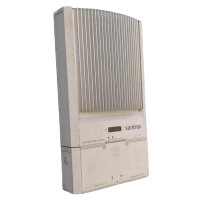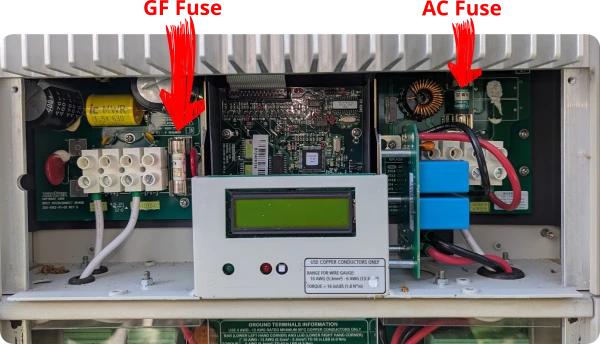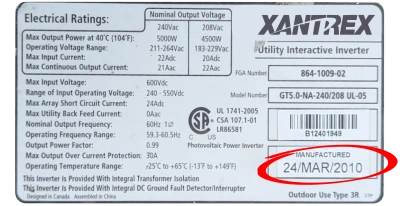

DC Voltage Fault
Inverter Off-lineDC voltage is present but incorrect
The inverter sees DC input but the voltage level is outside the acceptable operating range, or a string-level fault such as a blown internal DC fuse is detected.

gt
Inspect the solar array for shading or physical damage that may be affecting performance.
Ensure no recent changes (adding/removing panels) were made that may have altered the array voltage out of spec for this model.
If all switches and breakers are ON, try power cycling the inverter. To do so, both the DC and AC power sources must be disconnected long enough for the inverter to discharge. Place the switch on the inverter to the OFF position. If any other disconnect switches are present, place them in the OFF position. If there is a breaker for the inverter in the main service panel, place it in the off position. Wait for 3 minutes (or longer) to ensure the capacitors have discharged before placing all switches back into the ON position. The inverter should enter a self test sequence, and enter a 300 second countdown (required by code) before resuming production.
If the array is in full sun, all DC switches are on, and the message returns after power cycling, it may indicate an external issue with the DC cirucits, or the inverter itself may have failed internally. Contact your installer or solar professional for further troubleshooting.
Tips for Qualified Persons
The following procedures involve safety risks and potential for equipment damage. They are intended only for qualified personnel trained to identify and avoid the hazards that exist, and possess the appropriate PPE. These are general tips to aid professionals in troubleshooting, not instructions or directives to perform them.
We assume no liability for injury or damage resulting from their use.
- Inspect all terminal connections for proper torque, signs of overheating, or physical damage.
- Isolate the DC input circuits and verify voltage from positive to negative, ensuring correct polarity (If not isolated, combined strings may mask reverse polarity in open-circuit conditions).
- Verify DC volatges are within the allowd range (235–600Vdc), and ensure they do not exceede 600V DC on the coldest days.
- Verify that both POS-to-GND and NEG-to-GND voltages are 0V.
- If string fuses are present near the DC input terminals, verify continuity of each and clean contacts if necessary
- Verify correct combined DC voltage at the terminals left of the display.
- In most models, a DC ground-fault fuse is located to the left of the display. Confirm fuse ratings match inverter specifications and test the fuse for continuity, clean fuse contacts if needed.
- Inspect control and power boards for damage, corrosion, or signs of heat stress.
Shut down both AC and DC disconnects and wait for the inverter to fully discharge before accessing the lower wiring compartment.
Perform the following checks after removing the lower cover:
If voltage is missing or incorrect on either the DC inputs, trace the wiring upstream to ensure all disconnects and over-current protection devices are closed and functioning.
If DC volatge is correct at the terminals, remove the diplay cover to access the upper compartment. Before doing so, check the inverter’s part number using the Recall Lookup Tool and allow time for the compartment to vent. If the part number is listed under the recall, use additional caution while proceeding.

Inside the upper compartment, perform the following checks:
If all checks pass and proper DC voltages are present at the control board terminals, the inverter itself has likely failed. As the Xantrex GT series is no longer supported, replacement is typically the recommended solution.
In January 2011, Schneider Electric announced a voluntary recall of the Xantrex GT inverter that affected 25,000 units, manufactured between 2005 and 2010.
Check if your inverter was affected by this recall using the Xantrex Recall Lookup Tool

Xantrex GT series inverters were originally sold with a standard 10-year warranty. These inverters were popular in the late 2000s and early 2010s, primarily under the Xantrex brand prior to the company's acquisition by Schneider Electric.
The label is typically located on the top of the inverter, which includes the manufacture date as shown above. Not all inverters had this same label and many have since deteriated in the elements. After the acquisition, it is unclear whether Schneider Electric formally honored all prior warranties, regardless all GT units are now well beyond their original coverage period. Warranty support for these inverters is no longer active (as far as we are aware).
For questions related to legacy product warranty and support, you can contact Schneider Electric's solar support team at solar.se.com/us/en/support/ or call 1-833-391-8640
Xantrex Technology Inc. was founded in 1983 in British Columbia, Canada, and quickly became a leader in power electronics. The company specialized in advanced inverter and charger systems for renewable energy, marine, RV, and industrial applications. Over the years, Xantrex developed a reputation for building durable and reliable off-grid and backup power products.
In the early 2000s, as the residential solar market began to expand, Xantrex introduced its GT series of grid-tied solar inverters. These units, including models like the GT2.8, GT3.0, GT3.3, GT3.8, and GT5.0, were designed for residential and small commercial use.
The GT series was known for its fanless cooling design, which reduced noise and the need for maintenance, and for its simple LED display with basic status information. Certain models also supported advanced communication options including RS-232, Modbus, and even Zigbee, which was notably used in installations provided by SolarCity and Tesla.
Despite widespread adoption, the GT inverters developed a history of common failures over time, particularly related to degraded capacitors and controller board faults. In 2011, Schneider Electric issued a recall for certain GT inverter models that affected 25,000 units manufactured between 2005 and 2010.
Xantrex was acquired by Schneider Electric in 2008 for $489M. Schneider continued to manufacture and support the GT line for several years but eventually discontinued it as newer inverter technologies and more sophisticated monitoring features became industry standards. Schneider later introduced the Conext series for battery systems as a successor but eventually phased out much of its residential solar inverter line.
Today, the Xantrex brand is still in use, but its focus has returned to mobile and off-grid applications for RV, marine, and industrial power systems. The GT inverter line is considered a legacy product, no longer in production and with limited support, although it was a well-regarded device, and many units remain in operation today, many years later.
The best point of contact for service or repair issues is your original installer.
If your installer is no longer available, you can reach Schneider Electric’s solar support team for assistance with legacy Xantrex GT inverters:
Schneider Electric Solar Support
You can also call Schneider directly at:
1-833-391-8640
Note: Xantrex GT inverters are legacy products that are no longer supported under warranty, but Schneider may be able to offer guidance, documentation, or suggest third-party repair options.
DENVER RESIDENTS: Is your system located in the Denver, CO metro area? CONTACT US
